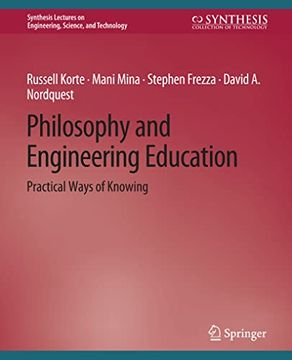Share
Philosophy and Engineering Education: Practical Ways of Knowing (in English)
Russell Korte
(Author)
·
Mani Mina
(Author)
·
Stephen Frezza
(Author)
·
Springer
· Paperback
Philosophy and Engineering Education: Practical Ways of Knowing (in English) - Korte, Russell ; Mina, Mani ; Frezza, Stephen
$ 47.36
$ 49.99
You save: $ 2.63
Choose the list to add your product or create one New List
✓ Product added successfully to the Wishlist.
Go to My WishlistsIt will be shipped from our warehouse between
Friday, May 24 and
Monday, May 27.
You will receive it anywhere in United States between 1 and 3 business days after shipment.
Synopsis "Philosophy and Engineering Education: Practical Ways of Knowing (in English)"
Pragmatism attends to the practical outcomes of what we think and do, the social community in which we practice, and the bases of experience to inform our ideas and practices. Practice theories help explain what we do as complex systems of activity. Together, pragmatism and practice theories help broaden our understanding of the nature of engineering work as a social practice having important consequences for individuals and society. The practical nature of engineering embedded in our complex social and community systems is emphasized. Of all the pragmatists John Dewey's influence on education has been the most profound.He promoted social democracy in education. Although he founded experimental schools with this as their goal of major interest, to engineering educators his promotion of problem solving through a form of inquiry is his major attraction. Its modern embodiment is problem-based learning. It requires teachers to become facilitators of learning rather than transmitters of knowledge. How, within the framework of a traditionally oriented curriculum Dewey's epistemology of inquiry-based learning might be introduced is discussed. Lonergan's basic method of the human mind underlying specialized methods offers a basis for a unified theory and pedagogy of engineering. It also provides for a conception of engineering that gives due recognition to its ethical character and to the need for engineering virtues. This knowing-based view of engineering, focused on "engineering insight," provides the basis for a core, discipline-neutral approach to engineering.It proposes an engineering education centered on norms inherent to the knowing process, specifically attentiveness and intentionality. These norms in turn provide a source for defining and developing engineering virtues and character.
- 0% (0)
- 0% (0)
- 0% (0)
- 0% (0)
- 0% (0)
All books in our catalog are Original.
The book is written in English.
The binding of this edition is Paperback.
✓ Producto agregado correctamente al carro, Ir a Pagar.

